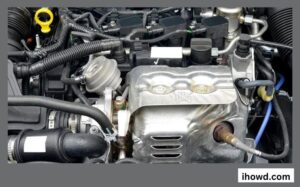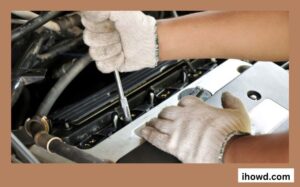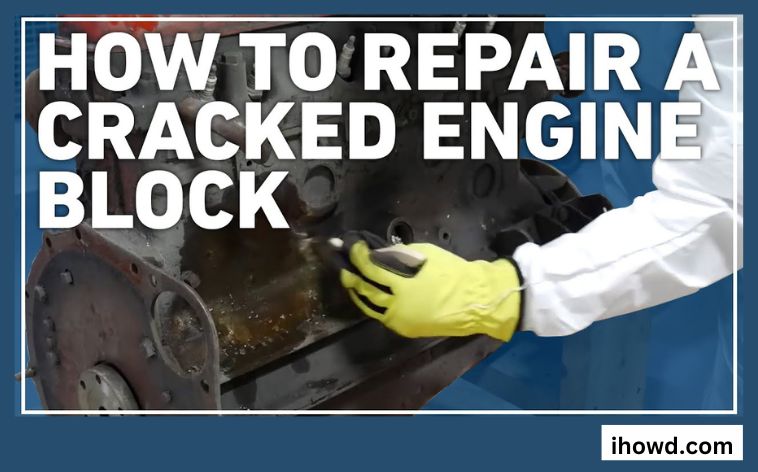Repair an Engine Block: Even if you aren’t a mechanic, you are aware that an engine block with cracks is not ideal. A fractured block is a serious issue that, in some circumstances, can be very expensive to fix. How can you tell if your block is broken, and what will it cost you to fix it? We will provide you with all the information you require. We will discuss the causes, symptoms, available repairs, and associated costs for an engine block crack. Let’s start now!
What Does a Cracked Engine Block Mean?

Your engine block is a solid piece of metal that was probably cast from either high-quality iron or, more likely, aluminium. Perfectly smooth and rounded cylinders are located inside the engine block, allowing the pistons to travel up and down with very minimal friction (of course, lubricated by oil). The crankshaft, which is rotated by the downward force of your pistons, is housed in the oil pan’s bottom. A water jacket is also cast into the engine block because the heat generated by all that moving metal is so great. One response to the question “why is my car overheating?” is that engine coolant dissipates heat-stealing energy as it passes through the sealed water jacket to the radiator.
How to Fix an Engine Block Crack
As you might expect, an engine block that is frozen or broken is a very dangerous problem.
People use batteries all the time, While many automobile owners might think selling the car is the best option, it doesn’t have to be that way as long as the problem is dealt with right away.
Ignoring an engine block that is frozen or fractured only causes more issues. You can quickly get back on the road if you have the necessary tools at your disposal.
Evaluate the damage
The severity of the harm must be understood before you start.
Start by looking into regions with a lot of stress. For instance, the combustion chamber’s other areas, spark plugs, valve seats, and cylinder heads.
Consider a magnetic particle test as an alternative. You might not be able to determine the depth of the crack without the use of this technology, which identifies defects in the engine block.
Additionally, it makes sense to look for the crack’s origin. If not, you might have to repeat this action in the future.
Signs Of An Engine Block Crack

Do you suspect that your block may be cracked? How can you spot a cracked engine block? Following a correct diagnosis, a competent technician can inform you with certainty, but in the meanwhile, below are some indications you can see. In order to limit any damage, you should have your car looked out as soon as you see any of these signs.
Heating up
The coolant in your car’s cooling system may not circulate properly if your engine block fractures. The automobile will overheat if the coolant is not circulated properly, which will prevent it from properly removing the heat from your engine. Overheating might be an indication of a fractured engine block, but it might simply be a damaged radiator or thermostat. Get the engine checked out straight away because you should never drive a car with an overheated engine.
Oil Spills
If you park your car in the driveway, do you notice any tiny oil puddles? Or, what’s worse, do you see any further sizable puddles there? Oil may leak out of your block’s crack and drip to the ground if it is cracked. While an oil leak may be caused by a faulty joint or seal, it may also be a sign of a more serious issue, such as a cracked block.
Mixing of coolant and engine oil
Engine oil and engine coolant should never be combined. These two fluids are kept apart by the channels in your engine. These two fluids may combine if there is a crack anyplace in the block. Check your overflow tank for dark or murky coolant, or check the dipstick for milky or foamy oil. Either of these is a bad indicator, and it suggests that you may have a block crack or a burst head gasket underneath the cylinder heads.
Smoke from the Hood
Have your car inspected if you notice white smoke coming from the engine compartment. Smoke will be produced if oil is leaking from your block. It will start to smoke as it becomes too hot as oil drips onto hot exhaust components or just the outside of the block itself. There is unquestionably an issue when you can see engine smoke coming from the hood.
Unsatisfactory Results
When you have a cracked block, your engine performance may suffer. Your engine will begin to lose compression, especially if the crack is inside a cylinder wall. Low engine compression can cause serious engine issues, and if your automobile starts to function at all, it will run extremely poorly. Delaying this issue may result in warped or bent pistons or possibly a total engine failure.
Conclusion
Although cracked engine blocks are no little matter, you do not need to throw your car in the trash right away. Occasionally, tiny cracks can be quickly mended without ever digging into the engine by applying a commercial sealer. Other times, you’ll need to spend a significant amount of money on major repairs. In either case, you should evaluate your particular circumstance to decide whether it would be better for you to fix the automobile or just sell it and go on.
You can choose a course of action that will benefit your finances the greatest by using the advice provided here. If you decide to sell, there are methods you may use to swiftly and conveniently find a buyer and receive cash. If not, be sure to locate a skilled mechanic who will do the repair correctly so that your automobile can return to the road and remain there for a long time to come.
Visit ihowd.com to read more article.
